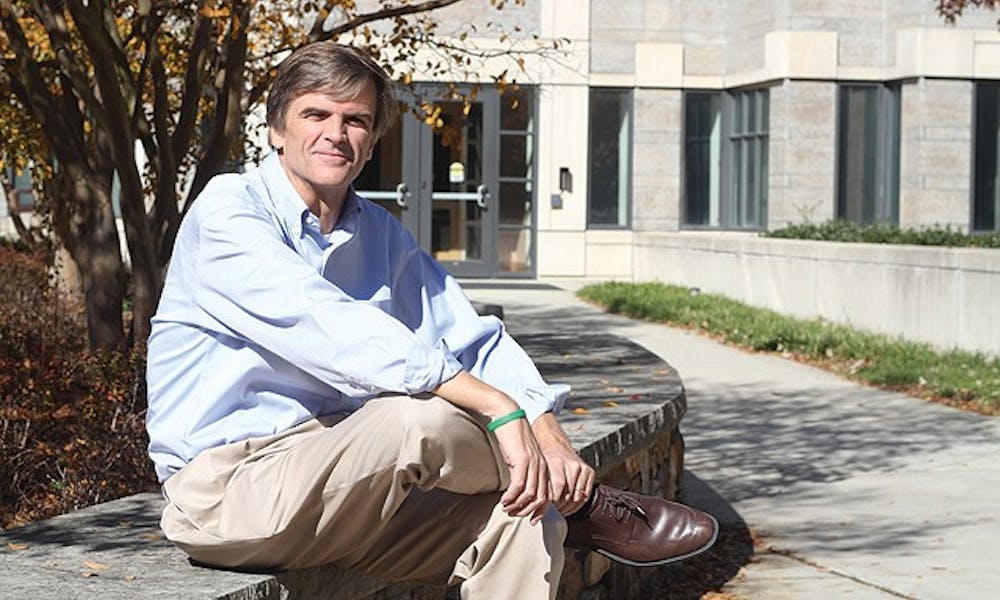Opening up his office on a Monday morning, Professor Pope “Mac” McCorkle, visiting lecturer at the Sanford School of Public Policy, is met by a desk scattered with slightly crumpled, thoroughly read newspapers. As a former Democratic political consultant, he keeps up with his news even after retiring to teach two years ago. Shuffling these papers away, McCorkle, a Memphis, Tenn. native, recounts in an easygoing southern accent his fourteen years working with Democratic governors and Senate candidates both in North Carolina and across the nation, including former Governor Mike Easley and current Governor Bev Perdue.
The Chronicle: You have worked with Democratic gubernatorial and Senate candidates across the country, but most of your work has been focused on North Carolina. What are the major things to know about N.C. politics specifically?
Mac McCorkle: Certainly for a Democrat, you want to own the education issue. There is this tradition that the winning formula for governor candidates and senate candidates has been what [former Duke president and North Carolina governor] Terry Sanford started. It’s a pro-economic development, very pro-education moderate progressive way, which is having trouble these days because the economy is not growing as fast as it has, but that’s been the Sanford tradition.
TC: The New Yorker article raised concern about the huge political influence of Art Pope [McCorkle was quoted in the article about the North Carolinian right-wing millionare]. Do the Democrats have a counterpart to contend with individuals like Pope who have so much political sway on the right?
MM: Democrats do not have a counterpart to Art Pope right now.... But I’m not big on the idea that we’ve got to have our own Art Pope. Individuals like that can matter on the margins, so he can extend a Republican advantage and I think he’s responsible for the Republicans having a veto-proof majority in the Senate right now, which is hugely important. But to be blunt about it, Art’s kind of getting old. We need people of the younger generation way more involved, and I’ve been counseling that the thing to do is to subsidize and support young people who may or may not want to set up an apparatus like Pope.
It’s kind of like fighting the last war—Art’s built this big shiny tank, and we, for the last twenty years, have been saying let’s go build our own shiny tank. But the idea that we’re going to be okay if we can somehow slay Art seems very naïve and dangerous, and we need to do our own thing and prepare for the future and not just criticize Art. Maybe we need to engage in guerilla warfare instead of building our own tanks.
TC: Do you see a mobilization of young people happening?
MM: Not enough. I think Occupy Wall Street might be a start to that. I just went there when I was visiting my sons and I felt a little old but not completely.
TC: What are your thoughts on the Occupy movement? Where do you think it will go from here?
MM: I think they are creating some social space for others. I can see it going to a majority statement like “We are the 99%,” but I’m not sure it translates easily into pressure group politics. I understand the criticism that people are making that ,“Oh, they don’t have an agenda,” but I think it’s setting a nice context and may help Obama....
In the end, successful progressive eras have a division of labor—outside/inside stuff. Obama’s about as good as we’re going to get, I think, on the inside, so my view is let’s focus on the outside. That’s why I think that Occupy Wall Street, even if it is funky and unclear, is good.
TC: Do you have anything to say to the young, politically engaged population at Duke?
MM: My main hobby horse these days is that conservatives and liberals of the younger generation need to not just get involved in the process but think about demanding a seat at the table, if not just taking it over. I was talking to a group the other night about the Founding Fathers, explaining how liberals too quickly dismiss them as dead white guys and how conservatives want to venerate them like they were these people who had timeless wisdom. Both are kind of absurd positions, but what young people should look at is this: even though we called them the Fathers, they were very young. A lot of them were in their 20s and 30s. What we need to do is replicate the Founding Fathers, not venerate or dismiss. The country really needs young people to step forward and challenge the dogmas left and right. You don’t have to be moderate or in the center but also don’t think, oh, I’ve got to be with the Paul Krugmans, or I’ve got to be right-wing.
Go out there and do your own thinking.
Get The Chronicle straight to your inbox
Signup for our weekly newsletter. Cancel at any time.

